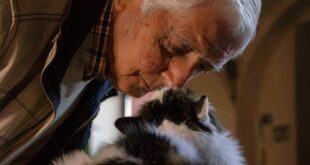Ageing comes to all of us, and with it, changes to our bodies and our health. Few escape the odd twinge or a decrease in energy levels, and even those with the sharpest minds may eventually find their memory is not quite as reliable as it once was. It’s the same with our pets as they enter their senior years, and fortunately, there are many ways we can help them to adjust. Check out these management tips on how to help your much-loved animal companions live as comfortably as possible into their senior years.
1. Temperature check
Older pets are less likely to be able to thermoregulate (maintain a healthy body temperature). Never leave them in situations where they can’t escape extreme temperatures, and use whatever cooling or heating systems you have at your disposal to keep room temperatures comfortable. If your senior pet lives outdoors (in a field, for example), ensure there is ample shade and shelter. Line kennels or cages with warm fabrics in the colder months.
2. Exercise
As pets age, their gait slows, and they appreciate more rest than they once did. Take care to ensure a younger animal (or human!) doesn’t exhaust an older pet. Make time to stop for rests if out walking your pet, and don’t expect them to cover the same distance they once did. Be mindful of when cats want to stop playing, and don’t let children pursue them when they obviously want to rest or sleep.
3. Check-ups
Pet’s usually present at a vet’s when there’s an obvious problem. However, as pets age, it can be especially sensible to take them for regular check-ups. This allows your vet to get on top of any age-related problems before they cause serious harm. If possible, ask for the same vet each time as your pet will get to know the person treating them, and find the visit less stressful.
4. Watch the fluids
Older animals tend to drink less. To avoid them becoming dehydrated (especially in warmer weather), keep water containers in more than one place in order to jog their memories, and change the water frequently to make it attractive. Aching joints are enough to deter an older pet from getting up to go to their water container, so keep water close to where your pet likes to rest.
5. Senior-friendly food
As pets age, they can lose both their appetite and their teeth, and before you know it, they have lost weight and condition. To avoid this, present food in such a way it is easy for them to eat it (this may mean dicing your cat or dog’s meat finely, or chopping your pony’s carrots and apples into small pieces. Offer food several times a day, and discard what’s left before it attracts bacteria. If you are concerned about dehydration, consider ways to add extra moisture to meals. Check with your vet to see if it’s wise to add extra nutrients to your older pet’s food.
6. Dish placement
Older pets often suffer from arthritis and stiff joints. If you’ve been in the habit of placing your cat’s food or water dishes at a level they leap up to, for instance, you may need to move the feeding station to a lower position. Similarly, an arthritic dog may not be able to comfortably reach down to a dish placed on the floor, in which case you can raise the food station up.
7. Consult
No one wants to say that final farewell to their faithful animal companion, but sadly, this often leads to owners allowing pets to live longer than is comfortable for them. Don’t make decisions, alone, on how long your ailing pet should live. Ask a vet to help you decide.
Pets are often our companions for many years. Like old friends, they deserve the very best care and attention we can provide.








Join the Discussion
Type out your comment here:
You must be logged in to post a comment.